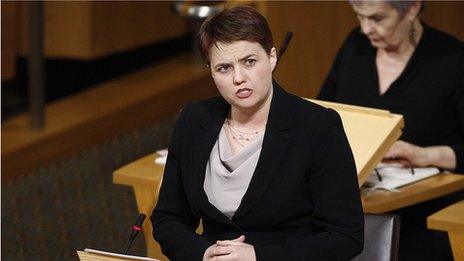Scottish independence: 'No cross-party plan' on devolution
- Published

Scottish Conservative leader Ruth Davidson said the three pro-Union parties would not set out a joint position on further devolution before the referendum
There will be no cross-party announcement on further devolution for Scotland before the referendum, the leader of the Scottish Tories has said.
In a speech in Edinburgh, Ruth Davidson hinted she was in favour of further tax-raising powers for Holyrood.
But she ruled out all three pro-Union parties reaching a joint agreement before the vote in September.
The SNP said the No campaign was "more interested in standing up for a Westminster elite".
The Tories said they would clarify their position before the referendum.
Conservative peer Lord Strathclyde is currently looking at the party's plans on further devolution as part of a commission set up by Ms Davidson last year.
However, in comments following a speech at the David Hume Institute in Edinburgh, she said no joint position from the Tories, Labour and Liberal Democrats, all members of the pro-Union Better Together campaign, would be set out before the vote on 18 September.
"I don't believe that there will be a detailed cross-party agreement before the referendum," said Ms Davidson. "None of the parties have ever said they would want to do that."
Labour has also set up a commission to explore the possibility of further powers for Holyrood, which is due to report in the spring.
Sir Menzies Campbell set out the Liberal Democrats' support for more devolution in a report titled Federalism - the best future for Scotland, external.
Earlier this week, the three parties united to dismiss the Scottish government's plan for a currency union between an independent Scotland and the rest of the UK should Scotland vote for independence.
Responding to Ms Davidson's speech, SNP MSP Sandra White said: "This startling admission from Ruth Davidson blows apart the No campaign's assertion that a No vote could deliver further powers.
"The people of Scotland support more powers - but as events this week have shown, the No campaign are more interested in standing up for a Westminster elite than standing up for Scotland.
"The Unionist parties were perfectly happy to gang up and agree to attempt to bully Scotland over the pound - that they can't agree on any prospect of further powers shows where their priorities lie."
'Default option'
Elsewhere, Chief Secretary to the Treasury Danny Alexander denied reports in The Herald newspaper, external that the UK government could ignore a Yes vote in the referendum and revert to the "status quo" if negotiations did not go smoothly.
A senior unnamed source within the coalition reportedly told the paper: "If Alex Salmond made impossible demands, we would not just roll over and agree to everything he wanted. If we could not reach agreement, the status quo would be the default option."
Speaking on BBC Radio's Good Morning Scotland programme, Mr Alexander said: "The UK government is and has been clear.
"We totally respect the right of people in Scotland who will vote in the referendum in September to make their decision.
"The result of the referendum will be respected, full stop, end of story."
First Minister Alex Salmond called the reports "astonishing and irresponsible".
He added: "The Westminster establishment are now so worried about losing the referendum that they are threatening to refuse to respect the democratic will of the people of Scotland and rip up the Edinburgh agreement signed in all good faith by the prime minister."